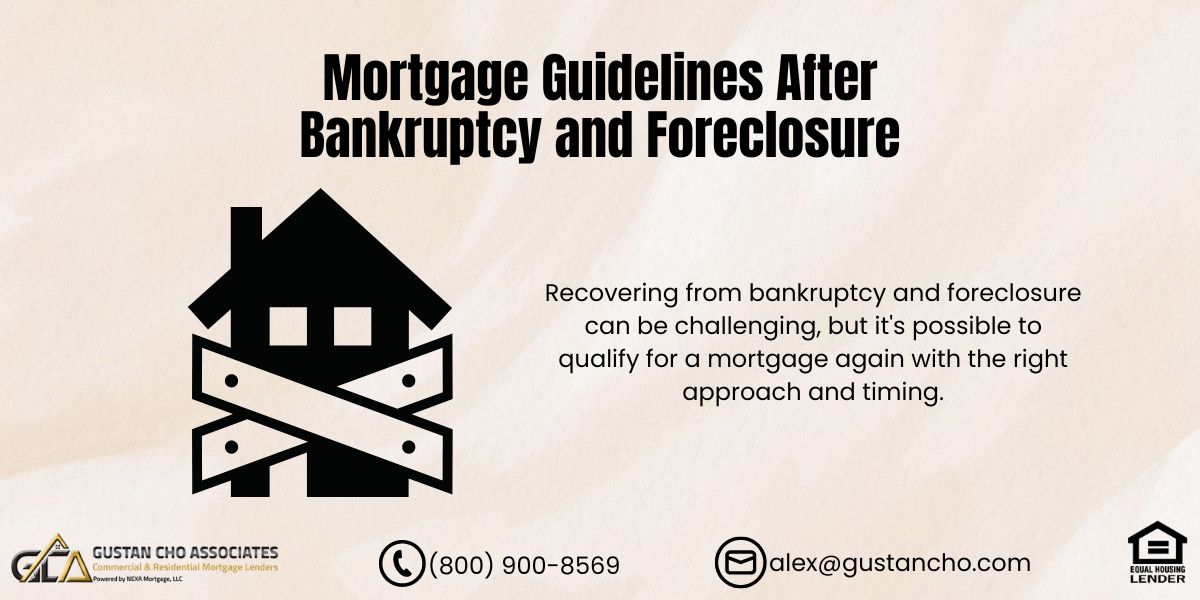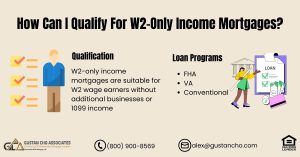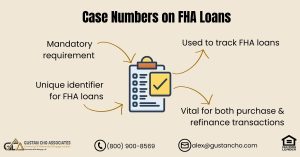This guide covers mortgage guidelines after bankruptcy and foreclosure on government-backed and conventional loans. Many homebuyers do not realize they can qualify for a mortgage after bankruptcy, foreclosure, deed-in-lieu of foreclosure, short sale. Mortgage guidelines after bankruptcy and foreclosure depends on the individual mortgage program.
Government and conventional loans have mandatory waiting periods after bankruptcy or a housing event. The waiting period mortgage guidelines after bankruptcy and foreclosure depend on the individual mortgage program.
Gustan Cho Associates offers Non-QM loans. There is no waiting period after bankruptcy, foreclosure, deed-in-lieu of foreclosure, and short sale. In this article, we need to cover and discuss mortgage guidelines after bankruptcy and foreclosure on government and conforming loans.
What Are The Mortgage Guidelines After Bankruptcy and Foreclosure
Recovering from bankruptcy and foreclosure can be challenging, but it’s possible to qualify for a mortgage again with the right approach and timing. Here are some general guidelines: Lenders will want to see that you have a stable, reliable income. An employment history is crucial, and being employed in the same job for at least two years can be beneficial. To get more about mortgage guidelines after bankruptcy and foreclosure, click here
Waiting Periods Mortgage Guidelines After Bankruptcy and Foreclosure
Depending on the mortgage loan program, there are specific waiting period mortgage guidelines after bankruptcy and foreclosure. After bankruptcy or foreclosure, your credit score will take a significant hit. It’s important to start rebuilding your credit immediately. Regularly monitoring your credit report, using secured credit cards responsibly, and paying all bills on time can help rebuild your score.
Waiting Period Requirements After Chapter 7 Bankruptcy to Qualify for a Mortgage
Typically, you must wait at least two years from the date of discharge before qualifying for most types of mortgages. For FHA loans, the waiting period is usually two years, but it can be as short as one year if you can show extenuating circumstances and improved financial management.
Waiting Period Requirements After Chapter 13 Bankruptcy to Qualify for a Mortgage
FHA and VA loans require a minimum waiting period of one year to make timely payments as part of the bankruptcy repayment plan. Conventional loans typically require a 2-year wait from the discharge date or four years from the dismissal date. These guidelines can vary significantly between lenders and are also influenced by changes in the housing market and banking regulations. Always consult a financial advisor or mortgage specialist for the most accurate and up-to-date advice tailored to your situation.
Waiting Period Requirements After Foreclosure to Qualify for a Mortgage
Foreclosure: Generally, you must wait seven years to qualify for a conventional loan after a foreclosure. However, the waiting period can be as short as 2 or 3 years for FHA and VA loans. It is critical to keep your debt-to-income ratio low. This ratio measures your total monthly debt payments versus your monthly income. Lenders typically prefer a ratio of 43% or lower. Lenders will scrutinize your financial background more closely if you have a bankruptcy or foreclosure. Be prepared to provide extensive documentation regarding your financial history and current status.
Mortgage Guidelines After Bankruptcy and Foreclosure on Traditional Loans
Government and conventional mortgages have a minimum waiting period requirement after bankruptcy or housing events. A housing event is a foreclosure, deed-in-lieu of foreclosure, or a short sale. The waiting period requirement differs depending on the loan program. Besides waiting out the mandatory waiting period, lenders want to see the borrower has re-established their credit and have no late payments since the bankruptcy or foreclosure. The VA and HUD allow borrowers to qualify for VA or FHA loans during the Chapter 13 Bankruptcy Repayment period. Chapter 13 Bankruptcy does not have to be discharged on FHA or VA loans.
Alternative Mortgage Guidelines After Bankruptcy and Foreclosure
Gustan Cho Associates offers alternative Non-QM loan programs. There are no waiting period requirements after bankruptcy or foreclosure with non-QM loans. Non-QM loans are becoming increasingly popular. Different lenders have different policies. Stay encouraged if one lender denies your application. Shop around and explore different mortgage products and lenders. Alternative financing loan programs, portfolio loans, and Non-QM loans are not hard money loans. They are portfolio loans and a type of alternative financing for borrowers who may not meet government, conforming, or traditional jumbo mortgage guidelines. Borrowers can qualify for a mortgage one day out of foreclosure or bankruptcy with non-QM loans. Click here to get apply for mortgage loan after bankruptcy and foreclosure
Mortgage Guidelines After Bankruptcy and Foreclosure on Non-QM Loans
To be eligible for non-QM loans after bankruptcy or a housing event, the following need to apply: Foreclosure, short sale, deed-in-lieu of foreclosure, modification, and recent late payments (must be settled). One day after the discharged date of Chapter 7, 13, or 11. Borrowers in Chapter 13 Bankruptcy repayment plan are not eligible for Non-QM loans until Chapter 13 has been discharged. There are other benefits to using non-QM loans.
Borrowers Benefiting Using Non-QM Mortgages
Besides the no waiting period after bankruptcy, foreclosure, deed in lieu of foreclosure, and/or short-sale, there are many other benefits of using non-QM loans: Non-QM mortgage guidelines allow late payments in the past 12 months which includes mortgage late payments.
Having a co-signer with good credit can help improve your chances for a mortgage. Housing or financial counseling can be extremely beneficial. These services can help you understand your options and prepare you for homeownership.
Self-employed borrowers do not have to use their income tax returns with our 12-month bank statement loans for self-employed borrowers. Deferred student loans that have been deferred for longer than 12 months are normally exempt from debt to income calculations by mortgage underwriters. Non-QM lenders can be negotiable when it comes to terms and guidelines. Exceptions can be made for borrowers who have strong compensating factors.
Down Payment and Reserves on a Home Purchase
The down payment requirements on non-QM loans depend on various factors. Here are the factors that affect the down payment requirements on Non-QM mortgages:
- Credit scores
- Type of property
- Borrower’s debt to income ratios
- The seasoning after bankruptcy, foreclosure, deed in lieu of foreclosure, and/or short-sale
- Mortgage rates depend on the borrower’s credit scores and/or down payment
- In general, a 10% to 20% down payment is required
- The minimum credit score required to be eligible for non-QM financing is 500 FICO
- Non-QM loans are for primary, second homes, and investment property financing
- Up to 55% debt to income ratio allowed with compensating factors
- Loan sizes between $100,000 to $5 million
- Other loan level pricing adjustments may apply.
Down Payment: You might need a larger down payment after bankruptcy or foreclosure. FHA loans typically require at least 3.5% down, which can vary depending on your credit score and other factors.
Mortgage Guidelines After Bankruptcy and Foreclosure on Conforming Loans
The following are the mandatory waiting period guidelines on conventional loans: There is a four-year waiting period is required from the discharge or dismissal date of Chapter 7 Bankruptcy to qualify for Conventional loans. There is a two-year waiting period after the Chapter 13 Bankruptcy discharged date. There is a four-year waiting period after a deed-in-lieu of foreclosure or a short sale to qualify for conventional loans. There is a four-year waiting period after a mortgage charge-off to qualify for conventional loans. If a mortgage was included as part of the bankruptcy and the homeowner did not reaffirm the mortgage, there is a four-year waiting period after bankruptcy to qualify for a mortgage. The date of the foreclosure or housing event does not matter. Get qualify for conforming loans after bankruptcy and foreclosure
HUD Mortgage Guidelines After Bankruptcy and Foreclosure
 HUD sets the mortgage guidelines after bankruptcy and foreclosure for FHA loans: There is a two-year waiting period after the Chapter 7 Bankruptcy discharged date. There is a three-year waiting period after a foreclosure, deed in lieu of foreclosure, and/or a short sale to qualify for FHA loans. Borrowers can qualify for FHA loans during Chapter 13 repayment plan one year starting Chapter 13 repayment plan. Chapter 13 Bankruptcy does not have to be discharged. Needs to be a manual underwrite. There are no waiting period requirements after the Chapter 13 Bankruptcy discharged date to qualify for FHA loans. Any borrower with a Chapter 13 Bankruptcy that has been seasoned for less than 2 years will need the FHA loan manually underwritten.
HUD sets the mortgage guidelines after bankruptcy and foreclosure for FHA loans: There is a two-year waiting period after the Chapter 7 Bankruptcy discharged date. There is a three-year waiting period after a foreclosure, deed in lieu of foreclosure, and/or a short sale to qualify for FHA loans. Borrowers can qualify for FHA loans during Chapter 13 repayment plan one year starting Chapter 13 repayment plan. Chapter 13 Bankruptcy does not have to be discharged. Needs to be a manual underwrite. There are no waiting period requirements after the Chapter 13 Bankruptcy discharged date to qualify for FHA loans. Any borrower with a Chapter 13 Bankruptcy that has been seasoned for less than 2 years will need the FHA loan manually underwritten.
Mortgage Guidelines After Bankruptcy and Foreclosure on USDA Lons
USDA allows for 100% financing with no down payment required by homebuyers. There is a three-year waiting period to qualify after the Chapter 7 bankruptcy discharge date. Buying a house after foreclosure, deed-in-lieu of foreclosure, a short sale has a three-year waiting period to qualify for USDA loans.
Mortgage Guidelines After Bankruptcy and Foreclosure on VA Loans
The VA has the most lenient mortgage guidelines when it comes to waiting period requirements: There is a two year waiting period after the Chapter 7 Bankruptcy discharged date to qualify for VA loans. Foreclosure, deed in of foreclosure, short sale have a 2-year waiting period to qualify for VA loans. Borrowers can qualify for VA loans during Chapter 13 repayment plan one year starting Chapter 13 repayment plan. Chapter 13 Bankruptcy does not have to be discharged to qualify for VA loans. Manual underwriting applies for VA loans during Chapter 13 Bankruptcy repayment plan. Bankruptcy trustee approval required.
There are no waiting period requirements after the Chapter 13 discharge to qualify for VA loans. Any Chapter 13 Bankruptcy that has not been seasoned for at least 24 months after the discharged needs to be manual underwriting.
A prior bankruptcy, foreclosure, deed-in-lieu of foreclosure, a short sale will not have any affect on the pricing of the loan. What this means is that there will be no pricing hits on mortgage rates. Many borrowers are under the impression they will get a higher rate due to a prior bankruptcy or a housing event. However, this is not true. Gustan Cho Associates has non-QM mortgages one day out of bankruptcy and foreclosure with a 30% down payment available for our borrowers. Talk to our expert for your mortgage and get process
FAQs About Mortgage Guidelines After Bankruptcy and Foreclosure
- What are the general mortgage guidelines after Bankruptcy and foreclosure? After experiencing Bankruptcy or foreclosure, it’s necessary to note that each loan program has specific waiting periods. When seeking a loan, the waiting period can vary depending on the type of loan and the details of your Bankruptcy or foreclosure event.
- How long must I wait after Bankruptcy or foreclosure to qualify for a mortgage? After filing for Chapter 7 bankruptcy, you are required to wait for two years before you can apply for most loans. Still, FHA loans may allow for a shorter wait period with certain conditions. Chapter 13 Bankruptcy requires a one-year wait for FHA and VA loans if timely payments are made. In contrast, conventional loans generally require a two-year wait post-discharge or four years post-dismissal. For foreclosure, the waiting period for conventional loans is seven years.
- What are the waiting period requirements for FHA loans after Bankruptcy and foreclosure? Chapter 7 has a two-year waiting period following the discharge date. In foreclosure, deed-in-lieu, or short sale cases, you must wait three years. However, with Chapter 13, there’s no waiting period post-discharge. Under specific conditions, you can qualify after one year of the repayment plan.
- Can I qualify for a mortgage with less than the standard waiting period? Under certain FHA programs, you may qualify for a mortgage one year after bankruptcy or foreclosure if you demonstrate extenuating circumstances and good financial management.
- What are non-QM loans, and how do they differ regarding bankruptcy and foreclosure? Non-QM loans offered by entities like Gustan Cho Associates do not have mandatory waiting periods post-bankruptcy or foreclosure. These loans are a great option for borrowers who may need to meet the standard mortgage qualifications due to recent financial events.
- What should I do to improve my chances of qualifying for a mortgage during the waiting period? Focus on rebuilding your credit by monitoring your credit report, using secured credit cards responsibly, and ensuring all bills are paid on time. It’s also beneficial to maintain stable employment.
- How does bankruptcy or foreclosure affect my down payment requirements? Different loans have varying down payment requirements. While conventional loans may require a higher down payment, FHA loans only require at least 3.5%. Non-QM loans may demand a down payment ranging from 10% to 30%, depending on factors such as credit scores and property type. Remember to calculate your net income, list your essential expenses, and review and adjust your budget regularly to achieve your financial goals.
- Are there special considerations for self-employed borrowers seeking mortgages post-bankruptcy or foreclosure? If you’re self-employed, you may find non-QM loans helpful since they offer options like bank statement loans that don’t require traditional income verification. This can be a great way to secure funding for your business needs.
- What if I still have a high debt-to-income ratio after waiting? Keeping your debt-to-income ratio low is crucial. Lenders typically prefer a 43% or lower ratio, though non-QM loans might allow up to 55% with compensating factors.
- Where can I get more personalized advice on qualifying for a mortgage after bankruptcy or foreclosure? It is advisable to consult with a mortgage specialist or financial advisor to receive tailored guidance for your unique financial situation. This can be especially helpful when navigating the complex post-bankruptcy or foreclosure lending landscape.








